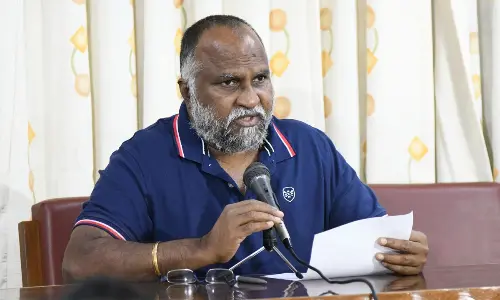Health care comes in focus, this time as risk for Democrats

Democratic presidential candidates are split over eliminating employer-provided health insurance under “Medicare for All.”
WASHINGTON: Democratic presidential candidates are split over eliminating employer-provided health insurance under "Medicare for All."
The risk is that history has shown voters are wary of disruptions to job-based insurance, the mainstay of coverage for Americans over three generations.
Those divisions were on display in the two Democratic debates this week, with Sens. Bernie Sanders and Elizabeth Warren calling for a complete switch to government-run health insurance for all. In rebuttal, former Vice President Joe Biden asserted that "Obamacare is working" and promised to add a public option. Sen. Kamala Harris was in the middle with a new Medicare for All concept that preserves private insurance plans employers could sponsor and phases in more gradually. Other candidates fall along that spectrum.
The debates had the feel of an old video clip for Jim McDermott, a former Democratic congressman from Washington state who spent most of his career trying to move a Sanders-style "single-payer" plan and now thinks Biden is onto something.
"There is a principle in society and in human beings that says the devil you know is better than the devil you don't know," said McDermott, a psychiatrist before becoming a politician. "I was a single-payer advocate since medical school. But I hit every rock in the road trying to get it done. This idea that you are going to take out what is known and replace it with a new government program — that's dead on arrival."
Warren, D-Mass., was having none of that talk Monday night on the debate stage. "Democrats win when we figure out what is right, and we get out there and fight for it," she asserted.
Confronting former Rep. John Delaney, D-Md., a moderate, Warren said, "I don't understand why anybody goes to all the trouble of running for president of the United States just to talk about what we really can't do and shouldn't fight for. ... I don't get it."
Here's a look at options put forward by Democrats and the employer-based system that progressives would replace:
MEDICARE FOR ALL
The Medicare for All plan advocated by Sanders and Warren would replace America's hybrid system of an employer, government and individual coverage with a single government plan paid for by taxes. Benefits would be comprehensive, and everybody would be covered, but the potential cost could range from $30 trillion to $40 trillion over 10 years. It would be unlawful for private insurers or employers to offer coverage for benefits provided under the government plan.
"If you want stability in the health care system, if you want a system which gives you freedom of choice with regard to doctor or hospital, which is a system which will not bankrupt you, the answer is to get rid of the profiteering of the drug companies and the insurance companies," said Sanders, a Vermont senator.
___
BUILDING ON OBAMACARE
On the other end is the Biden plan, which would boost the Affordable Care Act and create a new public option enabling people to buy subsidized government coverage.
"The way to build this and get to it immediately is to build on Obamacare," he said.
The plan wouldn't cover everyone, but the Biden campaign says it would reach 97% of the population, up from about 90% currently. The campaign says it would cost $750 billion over 10 years. Biden would leave employer insurance largely untouched.
Other moderate candidates take similar approaches. For example, Colorado Sen. Michael Bennet's plan is built on a Medicare buy-in initially available in areas that have a shortage of insurers or high costs.
___
THE NEW ENTRANT
The Harris plan is the new entrant, a version of Medicare for All that preserves a role for private plans closely regulated by the government and allows employers to sponsor such plans. The campaign says it would cover everybody. The total cost is uncertain, but Harris says she would not raise taxes on households making less than $100,000.
"It's time that we separate employers from the kind of health care people get. And under my plan, we do that," Harris said.
Harris' plan might well reduce employer coverage, while Sanders' plan would replace it. Either would be a momentous change.
Job-based coverage took hold during World War II years when the government encouraged employers and unions to settle on health care benefits instead of wage increases that could feed inflation. According to the Congressional Budget Office, about 160 million people under age 65 — or about half the population — are currently covered by employers.
A poll this week from the nonpartisan Kaiser Family Foundation underscored the popularity of employer coverage. Among people 18-64 with workplace plans, 86% rated their coverage as good or excellent.
Republicans already have felt the backlash from trying to tamper with employer coverage.
As the GOP presidential nominee in 2008, the Arizona Sen. John McCain proposed replacing the long-standing tax-free status of employer health care with a tax credit that came with some limits. McCain's goal was to cut spending and expand access. But Democrats slammed it as a tax on health insurance, and it contributed to McCain's defeat by Barack Obama.
"The potential to change employer-sponsored insurance in any way was viewed extremely negatively by the public," said economist Douglas Holtz-Eakin, who served as McCain's policy director. "That is the Achilles' heel of Medicare for All — no question about it."











